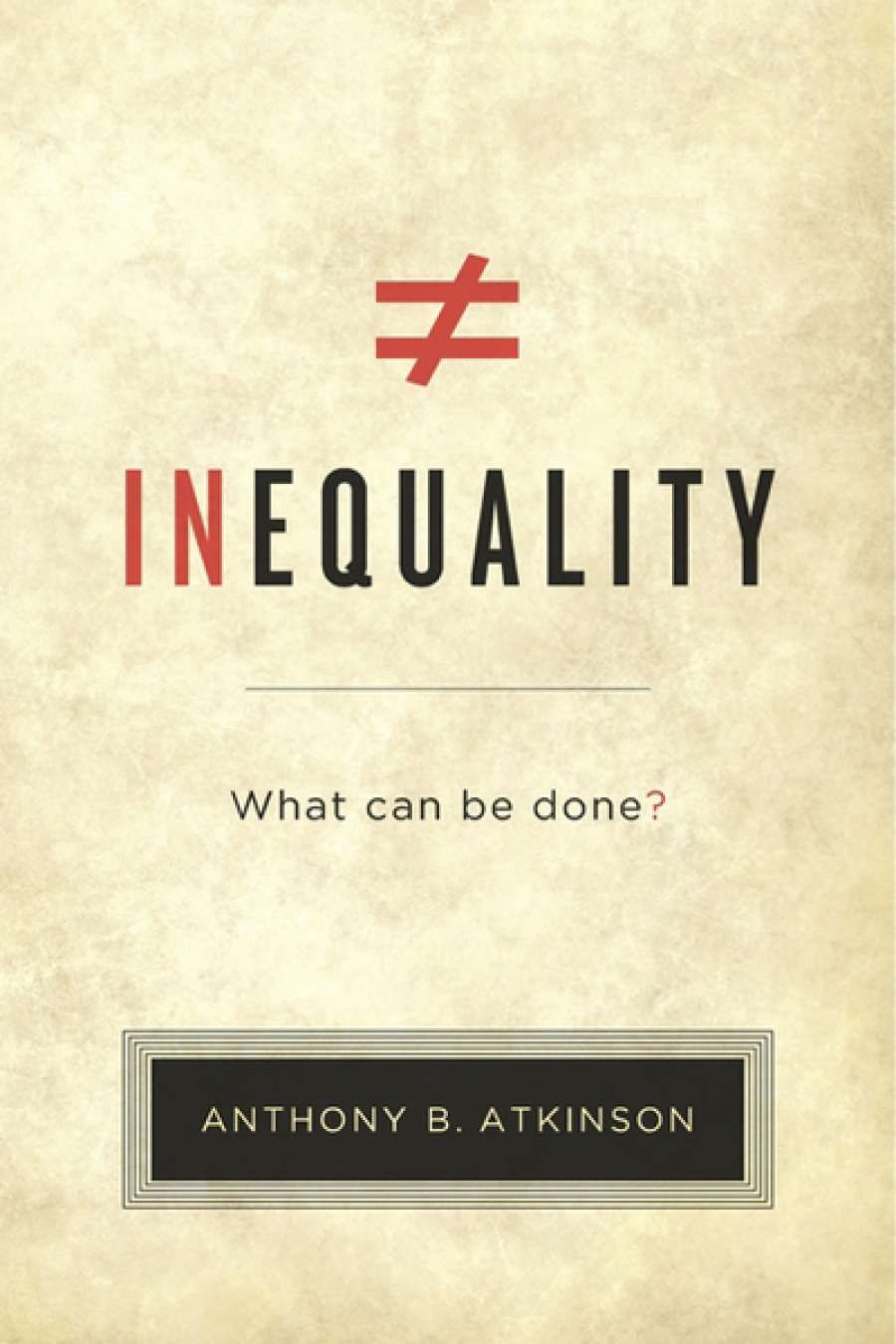
- Free Article: No
- Contents Category: Politics
- Custom Article Title: Mark Triffitt reviews 'Inequality' by Anthony B. Atkinson
- Book 1 Title: Inequality
- Book 1 Subtitle: What Can Be Done?
- Book 1 Biblio: Harvard University Press (Footprint), $67 hb, 395 pp, 9780674504769
In short, Atkinson knows his stuff. He understands arguments used by free marketeers (largely successfully) to marginalise inequality as a front-and-centre issue. These include assertions that growing the economic pie is more important than analysing or debating the best way to divide it; or that the problem is now so wrapped up in globalisation and rapid technological change that it has become too complex and costly to address.
This is why Atkinson devotes much space in Inequality to rebutting these arguments and asserting that tackling the rich–poor divide should, and can, be a priority. Not only are unchecked rates of inequality a major source of moral injustice, he argues. Not only do high rates of inequality impede economic growth. The widening rich–poor gap is becoming the economic and social equivalent of the curse of Cain. The burden of rising inequality is being shouldered by the young. Shrinking opportunities and reduced economic mobility for the young means serious ramifications for economic and social cohesion well into the future. This alone should prompt action.
Atkinson divides his book into three parts. The first – Diagnosis – synthesises various arguments as to why inequality in the West has risen during the past thirty years. In line with Piketty’s thesis, the ascendency of free market ideology since the early 1980s has undermined the integrity of ‘equalising mechanisms’, such as redistributive tax systems and the social safety net. This unfettering of markets has allowed them to take their natural course and carve out deepening socio-economic divisions.
‘Is it ‘‘efficient’’ to allow the gap between the rich and poor in leading Western countries to return to levels not seen since the nineteenth century?’
All this provides the necessary intellectual and empirical scaffolding for the book’s second part, Proposals for Action. While a number of Atkinson’s proposals are UK-specific, they have broader applicability. Some are old school: national targets to keep unemployment under set levels, guaranteed public unemployment for those who want it, and increased tax rates for the wealthy are straight from the welfare state playbook. Yet Atkinson offers them because, as he argues, they demonstrably worked in keeping inequality in check for a good deal of the twentieth century.
At the same time, he presents a number of genuinely innovative and thought-provoking measures. These include funding a national savings program to ensure that everyone has direct access to healthy investment returns. He proposes giving eighteen-year-olds a modest endowment – in essence an ‘inheritance for all’ program (a brave idea given the wealth divide now opening up between increasingly property-less younger generations and their seniors).
 Anthony B. Atkinson
Anthony B. Atkinson
Moreover, he argues the case for governments to aggressively reshape twenty-first century markets and thus redress inequality at the source. For example, he proposes that governments should assert far more control over the direction of technological change. He reasons that since government-funded research and development have helped to create many of the new digital technologies that are driving much of the current economic disparity, governments should adopt a far more active role in making sure new technologies support, not diminish, employment opportunities for the less well off.
In the book’s final part – Can It Be Done? – Atkinson systemically dismisses various arguments as to why reducing inequality rates is too difficult to achieve. Potential solutions are plentiful, he asserts. As he also demonstrates, far-reaching proposals can be funded without overly crimping economic growth. The missing ingredients are policy imagination and political will.
By presenting a strategic combination of new and established ideas, Atkinson shows why addressing the growing pervasiveness of inequality in the twenty-first century requires a sustained attack on many fronts. It also requires seeing economics not just as a debate about numbers but as a debate about people. ‘It does matter that some people can buy tickets for space travel when others are queuing for food banks,’ he writes.
‘Atkinson has been at the centre of research into inequality for more than four decades’
In Australia, policy thinking and debate on growing inequality and how to fix it is at least a decade behind what is going on elsewhere. This is partly because Australians are hard-wired to see themselves as intrinsically egalitarian. Through this prism, inequality becomes an issue of second- or third-order importance, even though Australia’s rates have been steadily rising over the past three decades.
However, this mindset also reflects the dearth of innovative thinking across most economic and social policy areas in this country. In government, business, and even some welfare sector circles, the attitude persists that remedying policy problems involves letting markets do their thing. In a post-GFC world of permanent economic turbulence, the penny has yet to drop that markets are no longer a reliable policy panacea, least of all for addressing the rich–poor gap they created in the first place.
Inequality should be mandatory reading for Australia’s leaders. Some readers may find it difficult to wade through the datasets and complex economic arguments, but this is because the issue itself is a hard slog; there are no convenient or simple solutions. Atkinson shows what might be possible if we stretch our collective imagination and focus on innovative ways to address what is emerging as the defining issue of our time.


Comments powered by CComment